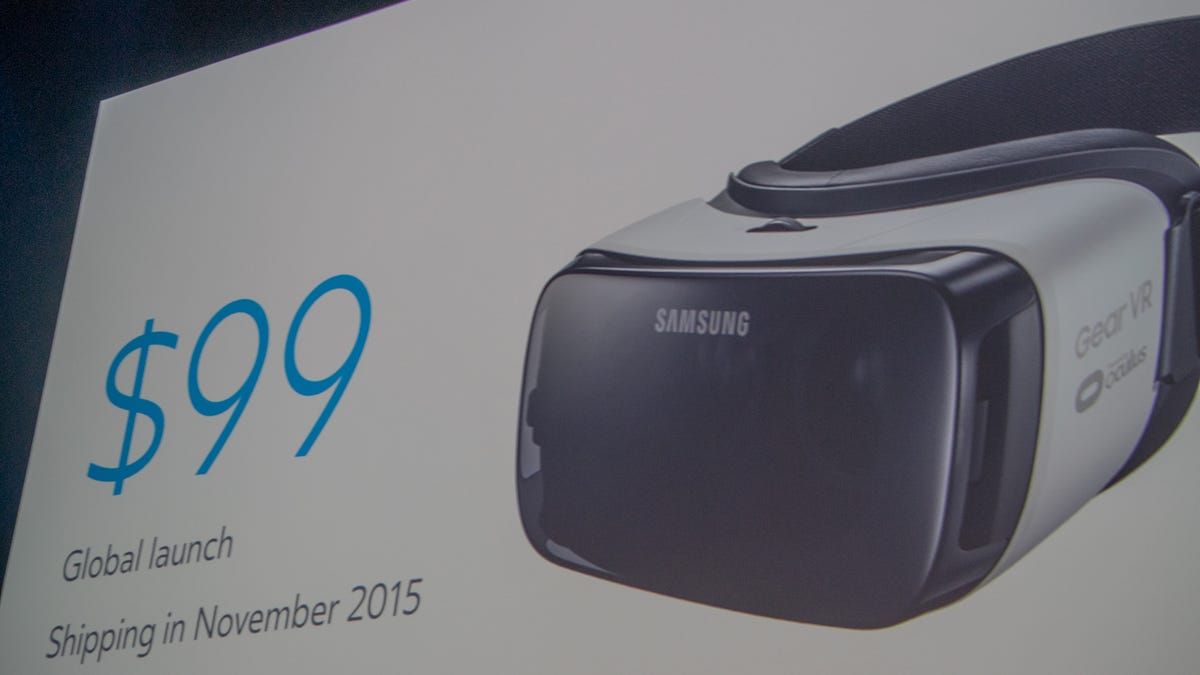Samsung, Facebook's Oculus plan November launch for Gear VR headset, at $99
One of the world's first virtual reality headsets for consumers is coming to the market in time for the holiday shopping season. Oculus says it's prepared.

HOLLYWOOD, Calif. -- Virtual reality is about to become very real.
Smartphone giant Samsung and Facebook subsidiary Oculus VR will launch in November the first virtual reality headset widely available to consumers. The headset, called the Gear VR , will cost $99 and work with mobile devices, including Samsung's lineup of phones from this year such as the newly released Note 5 and Galaxy S6 .
"With mobile VR, you only need a great mobile game device and a smartphone," said Oculus CEO Brendan Iribe, speaking at the company's developer conference here.
The launch marks an inflection point for the nascent VR industry. The headset, a chunky black box that covers a user's eyes, will be the first test of how willing consumers are to add a new device to their already cluttered living rooms. Some industry experts see a rosy future, with forecasts of as many as 30 million units per year shipping by 2020. Others warn those figures may be overly optimistic.
Still, the potential for VR, which places users in a computer-generated world, has attracted many of the tech industry's largest companies. Facebook CEO Mark Zuckerberg said VR could potentially have as much impact on the way we live and work as smartphones and tablets have. Facebook purchased Oculus last year for $2 billion.
"VR is the next platform, where anyone can create and experience anything," Zuckerberg said at the event.
The most obvious application for the technology is video games, giving developers the opportunity to create immersive, 3D environments as opposed to the flat, two-dimensional experiences they can currently make for televisions and mobile devices. Oculus has struck partnerships with game makers to ensure plenty of virtual worlds are available for early adopters to explore. For example, the company struck agreements with Sega, Midway and Namco to bring classic arcade games like Pac-Man to the device.
Other highly anticipated games, such as a new title from Monument Valley maker Ustwo, are also planned for the device. Playful, a game company in Texas, will release Lucky's Tale, a cartoonish adventure game, in time for Gear VR's launch. Similarly, CCP, a game maker in Iceland, is planning a high-energy space shootout called Eve: Gunjack.
Oculus is also working with Microsoft to adapt its technology to the popular Xbox video game console, and it's working with media companies like Netflix, 20th Century Fox and Lionsgate to bring hit films and TV shows to the device as well.
Oculus isn't the only company building VR devices. Smartphone maker HTC is partnering with game maker Valve to release later this year a competing headset, Vive. Sony is working on PlayStation VR, while Oculus plans another headset, Rift, that will work with computers when it's released early next year.
To make the Oculus Rift more appealing to customers, Oculus said, it has partnered with companies like Alienware, Dell and Asus to sell PCs that are guaranteed to power virtual reality games and experiences. Some of those PCs, Oculus said, will cost less than $1,000.
A long time coming
VR has been a common trope in science fiction -- think Star Trek -- where it's been a key element of training and entertainment simulations. But its history in the real world has been marked by frustration as clunky technology and high price tags discouraged both companies and consumers from embracing it.
After decades of false starts, including the high-profile failure of game giant Nintendo's Virtual Boy, the industry may have a product it can sell at an affordable price. VR headsets contain hundreds of high-tech parts, many of which are also used in smartphones, a booming market where leading companies have driven down costs for everything from high-quality screens to gyroscopic sensors.
Palmer Luckey, the 23-year-old inventor behind Oculus, is also behind the optimism. His Rift headset reignited interest in VR when it was announced in 2012, promising to make the technology affordable and easy to use. Oculus quickly became one of the leading companies making the technology, attracting some of the most high-profile names in the technology industry, such as VR researcher Michael Abrash and game making legend John Carmack, who headed development of key games like Doom and Quake.
Abrash said the attention the industry is getting and the speed with which it's growing has been surprising. "Just a few years ago, all of this would have been totally inconceivable," he said.
Oculus also offered details about the touch-controllers it developed for the Rift headset. The company said they'll be offered to consumers by the middle of next year, and that Oculus will have a compliment of games and experiences prepared. One will be called Toy Box, in which people can stack blocks, throw balls and shoot guns.
All of this will likely attract enthusiasts to purchase its device, but it's unclear whether general consumers will buy in. Zuckerberg said that even smartphones didn't sell in large numbers initially, and he suggested VR might follow that trend as well. "Facebook is committed to this for the long term," he said.

